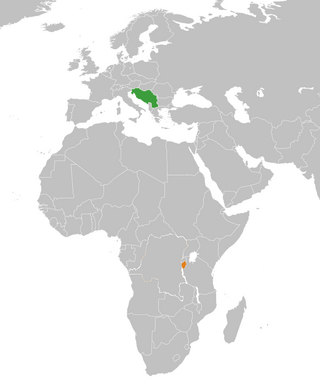Contents
This is a list of museums in Burundi .
This is a list of museums in Burundi .
| Name | Original name | Location | Foundation | Subject |
|---|---|---|---|---|
| National Museum of Gitega | Musée National de Gitega | Gitega | 1955 | History and ethnography |
| Living Museum of Bujumbura | Musée Vivant de Bujumbura | Bujumbura | 1977 | Wildlife, nature and culture |
| Geological Museum of Burundi | Musée de Geologie du Burundi | Bujumbura | Geology |

Bujumbura, formerly Usumbura, is the economic capital, largest city and main port of Burundi. It ships most of the country's chief export, coffee, as well as cotton and tin ore. Bujumbura was formerly the country's political capital. In late December 2018, Burundian president Pierre Nkurunziza announced that he would follow through on a 2007 promise to return Gitega its former political capital status, with Bujumbura remaining as economical capital and center of commerce. A vote in the Parliament of Burundi made the change official on 16 January 2019, with all branches of government expected to move to Gitega within three years.
ISO 3166-2:BI is the entry for Burundi in ISO 3166-2, part of the ISO 3166 standard published by the International Organization for Standardization (ISO), which defines codes for the names of the principal subdivisions of all countries coded in ISO 3166-1.

Burundi is divided into eighteen provinces, each named after their respective capital with the exception of Bujumbura Rural.

Gitega, formerly Kitega, is the political capital of Burundi. Located in the centre of the country, in the Burundian central plateau roughly 62 kilometres (39 mi) east of Bujumbura, the largest city and former political capital, Gitega is the country's fourth largest city and former royal capital of the Kingdom of Burundi until its abolition in 1966. In late December 2018, Burundian president Pierre Nkurunziza announced that he would follow on a 2007 promise to return Gitega its former political capital status, with Bujumbura remaining as economic capital and centre of commerce. A vote in the Parliament of Burundi made the change official on 16 January 2019, with all branches of government expected to move in over three years.

This article lists the prime ministers of Burundi since the formation of the post of Prime Minister of Burundi in 1961 until the present day. The office of Prime Minister was most recently abolished in 1998, and reinstated in 2020 with the appointment of Alain-Guillaume Bunyoni.

The Burundi national football team,, nicknamed The Swallows, represents Burundi in international football and is controlled by the Football Federation of Burundi. The team has never qualified for the World Cup. Burundi previously did come very close to qualifying for the 1994 Africa Cup of Nations, losing only on penalties to Guinea in a playoff. However, in 2019, it qualified for the first time in a major tournament, and took part in the Africa Cup of Nations finals in Group B, but lost all its matches and left from the group stage without scoring a single goal.

Gitega is one of the 18 provinces of Burundi. Its capital is Gitega, which is also the national capital. It has a population of 725,223 as of 2008 and an area of 1,979 square kilometres (764 sq mi).

The Senate is the upper chamber of Parliament in Burundi. It consists of between 39 and 56 members who serve 5-year terms. The current Senate was elected on 20 July 2020 and consists of 39 members. Under the newly promulgated 2018 constitution and following the new administrative division, the senate similarly to the national assembly saw its number of seats reduced. The senate goes from 39 seats to 13 seats starting from the 2025 legislative elections.

The position of vice-president of the Republic of Burundi was created in June 1998, when a transitional constitution went into effect. It replaced the post of Prime Minister.

Burundi first participated at the 1996 Olympic Games, and has sent athletes to compete in every Summer Olympic Games since then. The nation has never participated in the Winter Olympic Games.

The following outline is provided as an overview of and topical guide to Burundi:

Burundi, officially the Republic of Burundi, is a landlocked country in the Great Rift Valley at the junction between the African Great Lakes region and Southeast Africa, with population of over 14 million people. It is bordered by Rwanda to the north, Tanzania to the east and southeast, and the Democratic Republic of the Congo to the west; Lake Tanganyika lies along its southwestern border. The capital city is Gitega and the largest city is Bujumbura.

Burundi is one of the poorest African countries, burdened by a high prevalence of communicable, maternal, neonatal, nutritional, and non-communicable diseases. The burden of communicable diseases generally outweighs the burden of other diseases. Mothers and children are among those most vulnerable to this burden.
The International Council of Museums defines a museum as "a not-for-profit, permanent institution in the service of society that researches, collects, conserves, interprets and exhibits tangible and intangible heritage. Open to the public, accessible and inclusive, museums foster diversity and sustainability. They operate and communicate ethically, professionally and with the participation of communities, offering varied experiences for education, enjoyment, reflection and knowledge sharing.”

Burundi and the former Socialist Federal Republic of Yugoslavia were both members of the Non-Aligned Movement and they developed their relations in the framework of the Cold War Third World cooperation.